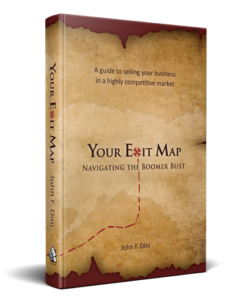 Your ExitMap Blog
Your ExitMap Blog
Exit Planning Articles Focused on Improving Value
Build: Improving Value
Enhancing the value of your business takes on new importance when you are looking at cashing out. How do you secure employees and customers? How do systems and processes affect your sale price? What specific areas of improvement will make your business more attractive?
Enhancing the value of your business takes on new importance when you are looking at cashing out. How do you secure employees and customers? How do systems and processes affect your sale price? What specific areas of improvement will make your business more attractive?
Most Recent Your ExitMap Blog Articles
Ambiguity Kills Value Ambiguity kills value. That was a key point in a white paper from Orange Kiwi that I read over the holidays. Taken from the PhD thesis of Dr. Allie Taylor, the paper describes the psychological profile of entrepreneurs, and their historical reluctance to begin an exit planning process. According to Dr. Taylor, entrepreneurs have five major behavioral traits; Risk Taking, Innovativeness, Need for Achievement, tolerance for Ambiguity and a locus for Control. This follows closely my description of the mind of an entrepreneur in Hunting in a Farmer’s World. In that book I discuss the traits of tenacious problem solving and the ability to navigate in the ... Read more Ambiguity kills value. That was a key point in a white paper from Orange Kiwi that I read over the holidays. Taken from the PhD thesis of Dr. Allie Taylor, the paper describes the psychological profile of entrepreneurs, and their historical reluctance to begin an exit planning process. According to Dr. Taylor, entrepreneurs have five major behavioral traits; Risk Taking, Innovativeness, Need for Achievement, tolerance for Ambiguity and a locus for Control. This follows closely my description of the mind of an entrepreneur in Hunting in a Farmer’s World. In that book I discuss the traits of tenacious problem solving and the ability to navigate in the ... Read more Four Basics of Exit Planning 1: Valuation There are four basics an owner should address before beginning any exit, succession, or transition plan. They are Valuation, Distance to Goal, Prospective Buyers, and Professional Team. First, my apologies for missing a tri-weekly post. Between trips to Denver for BEI’s National Exit Planning Conference, Dallas for a client, San Antonio for our own XPX Exit Planning Summit, Nashville for the national EPI Exit Planning Summit, and St. Louis for Archford’s Metro Business Owner Summit, I kind of lost track of my posting schedule. Here is the first of the four basic requirements. I promise not to dally in posting the rest of the full ... Read more There are four basics an owner should address before beginning any exit, succession, or transition plan. They are Valuation, Distance to Goal, Prospective Buyers, and Professional Team. First, my apologies for missing a tri-weekly post. Between trips to Denver for BEI’s National Exit Planning Conference, Dallas for a client, San Antonio for our own XPX Exit Planning Summit, Nashville for the national EPI Exit Planning Summit, and St. Louis for Archford’s Metro Business Owner Summit, I kind of lost track of my posting schedule. Here is the first of the four basic requirements. I promise not to dally in posting the rest of the full ... Read more Exit Planning: Ripples and Ripples. Every stone thrown into a pond creates ripples. Every advance in technology does the same. The late Stephen Hawking said that we were progressing too quickly. Along with other technology and science notables, he argued for a slowing down of development in Artificial Intelligence (AI). Most current “AI” is actually machine learning. As computing speed increases exponentially, the ability of a computer to calculate, test hypotheses and weigh varying outcomes increases as well. Computers can now beat the best humans at every game ever invented. From Chess to Go, and from Texas Hold ‘Em to Ms. Pac Man, binary geniuses are sorting through billions of possibilities, and ... Read more Every stone thrown into a pond creates ripples. Every advance in technology does the same. The late Stephen Hawking said that we were progressing too quickly. Along with other technology and science notables, he argued for a slowing down of development in Artificial Intelligence (AI). Most current “AI” is actually machine learning. As computing speed increases exponentially, the ability of a computer to calculate, test hypotheses and weigh varying outcomes increases as well. Computers can now beat the best humans at every game ever invented. From Chess to Go, and from Texas Hold ‘Em to Ms. Pac Man, binary geniuses are sorting through billions of possibilities, and ... Read more Selling Your Business - the Buyer's Eyes Selling your business is much like selling a house. In order to realize the highest price possible, you want it to look its best. The other day I passed an independent gas station/convenience store. The marquee at the curb advertised their price for “unlead” gas. Really? Unleaded fuel has been required for new cars since 1975. Lead was completely banned as an additive 22 years ago. That means anyone who has bought a new car in the last 40-plus years, and every driver under 40 years old, has never purchased anything but unleaded gas. What does that indicate about the maintenance of the business? If it has been decades ... Read more Selling your business is much like selling a house. In order to realize the highest price possible, you want it to look its best. The other day I passed an independent gas station/convenience store. The marquee at the curb advertised their price for “unlead” gas. Really? Unleaded fuel has been required for new cars since 1975. Lead was completely banned as an additive 22 years ago. That means anyone who has bought a new car in the last 40-plus years, and every driver under 40 years old, has never purchased anything but unleaded gas. What does that indicate about the maintenance of the business? If it has been decades ... Read more Business Buyers and Disintermediation In the last post, we discussed the reluctance of many prospective business buyers to deal with the regulatory burden of being an employer or service provider. You may be among the lucky few whose profession doesn’t require licensing. Even better, you may have qualified employees who are able to run the business without you. There are other issues that concern younger buyers, however. One of these is the threat of disintermediation. That’s a trendy word for what we used to call “bypassing the middle man,” but it applies to many businesses that are being made obsolete by technology. Disintermediated Businesses How many business people still ... Read more In the last post, we discussed the reluctance of many prospective business buyers to deal with the regulatory burden of being an employer or service provider. You may be among the lucky few whose profession doesn’t require licensing. Even better, you may have qualified employees who are able to run the business without you. There are other issues that concern younger buyers, however. One of these is the threat of disintermediation. That’s a trendy word for what we used to call “bypassing the middle man,” but it applies to many businesses that are being made obsolete by technology. Disintermediated Businesses How many business people still ... Read more What's Wrong with the Buyer Generations? Many of the upcoming buyer generations can’t or won’t run Baby Boomer businesses. This is (or should be) of concern to sellers everywhere. “The children now love luxury; they have bad manners, contempt for authority; they show disrespect for elders and love chatter in place of exercise. Children are now tyrants, not the servants of their households.” Attributed to Socrates by Plato. Elders have been complaining about their offspring for 2,500 years. The complaints change only in the activity bemoaned. “Chatter in place of exercise” is replaced by those damn radios, or automobiles, or television, or rock’n’roll, or cell phones or texting. It’s amazing when you realize that ... Read more Many of the upcoming buyer generations can’t or won’t run Baby Boomer businesses. This is (or should be) of concern to sellers everywhere. “The children now love luxury; they have bad manners, contempt for authority; they show disrespect for elders and love chatter in place of exercise. Children are now tyrants, not the servants of their households.” Attributed to Socrates by Plato. Elders have been complaining about their offspring for 2,500 years. The complaints change only in the activity bemoaned. “Chatter in place of exercise” is replaced by those damn radios, or automobiles, or television, or rock’n’roll, or cell phones or texting. It’s amazing when you realize that ... Read more Employee Retention Before and After Your Exit In most businesses, employee retention is a material factor in valuation and transferability. The ability of a buyer to assume control of a fully-functional organization has substantial influence on his or her perception of a company’s value. Any need to pay the seller for an extended period of training adds a redundant executive salary to the projected operating costs. Concern that key personnel may resign or be recruited away by a competitor adds a level of uncertainty to the transfer. Of course, the basic premise of “The more you work in the business, the less it is worth.” always applies. Even if you’ve effectively delegated most of ... Read more In most businesses, employee retention is a material factor in valuation and transferability. The ability of a buyer to assume control of a fully-functional organization has substantial influence on his or her perception of a company’s value. Any need to pay the seller for an extended period of training adds a redundant executive salary to the projected operating costs. Concern that key personnel may resign or be recruited away by a competitor adds a level of uncertainty to the transfer. Of course, the basic premise of “The more you work in the business, the less it is worth.” always applies. Even if you’ve effectively delegated most of ... Read more Celebrating Mr. Fezziwig To celebrate the holiday, I’m reprinting a post from 2013 about the underappreciated boss of A Christmas Carol, Mr. Fezziwig. I hope that you enjoy it. Merry Christmas! Last week was the 170th anniversary of the publication of Charles Dickens’ A Christmas Carol (December 17, 1843). The immortal words of Ebenezer Scrooge are ingrained in the memory of the entire English speaking world. I’d venture to guess that “Bah, Humbug!” can be correctly identified as to source and speaker by over 99% of those reading this. The novella, serialized in five parts, was not a commercial success. Unhappy with the sales of his previous novel (Martin Chuzzlewit– no wonder!), ... Read more To celebrate the holiday, I’m reprinting a post from 2013 about the underappreciated boss of A Christmas Carol, Mr. Fezziwig. I hope that you enjoy it. Merry Christmas! Last week was the 170th anniversary of the publication of Charles Dickens’ A Christmas Carol (December 17, 1843). The immortal words of Ebenezer Scrooge are ingrained in the memory of the entire English speaking world. I’d venture to guess that “Bah, Humbug!” can be correctly identified as to source and speaker by over 99% of those reading this. The novella, serialized in five parts, was not a commercial success. Unhappy with the sales of his previous novel (Martin Chuzzlewit– no wonder!), ... Read more Life After Exit -- Time is of the Essence From time to time, we share real stories about life after exit from owners who have sold their businesses. Some are great and some… not so much. The have agreed to share their experiences to help other owners prepare for both the process of transferring their companies and what comes after. The Business BVA Scientific, a distributor of laboratory supplies and equipment, started in Bob and Nancy Davison’s bedroom with the garage serving as the “warehouse.” Both had a background in laboratory supply sales, and they focused on building deeper customer relationships than the multi-billion dollar vendors who dominate the industry. That approach helped the ... Read more From time to time, we share real stories about life after exit from owners who have sold their businesses. Some are great and some… not so much. The have agreed to share their experiences to help other owners prepare for both the process of transferring their companies and what comes after. The Business BVA Scientific, a distributor of laboratory supplies and equipment, started in Bob and Nancy Davison’s bedroom with the garage serving as the “warehouse.” Both had a background in laboratory supply sales, and they focused on building deeper customer relationships than the multi-billion dollar vendors who dominate the industry. That approach helped the ... Read more The Right Price for Your Business “If someone offered me the right price, I’d sell in a minute!” Exit planners and business brokers hear it all the time. “Anything is for sale if the price is right!” What is the “right” price? Of course, you can fantasize about a windfall from a buyer who has far more money than brains. Some of the fast-talking “business brokers” (the ones who get more revenue from preparing offering books than actually selling companies), will pitch their secret list of buyers in Europe and Asia who routinely overpay for businesses. In case you didn’t know, the largest advisory firms in Europe and Asia are the same ones ... Read more “If someone offered me the right price, I’d sell in a minute!” Exit planners and business brokers hear it all the time. “Anything is for sale if the price is right!” What is the “right” price? Of course, you can fantasize about a windfall from a buyer who has far more money than brains. Some of the fast-talking “business brokers” (the ones who get more revenue from preparing offering books than actually selling companies), will pitch their secret list of buyers in Europe and Asia who routinely overpay for businesses. In case you didn’t know, the largest advisory firms in Europe and Asia are the same ones ... Read more Why GenXers Won't Buy Your Business There are six reasons why GenXers won’t buy your business. Last week I presented a webinar for the Exit Planning Institute entitled “The Perfect Storm.” It looks at six factors impacting the desire and the ability of Generation X buyers to acquire a Baby Boomer business. The first three, demographic, psychographic and sociographic, are macro trends that make Xer’s unlikely to buy any business that requires capital or more than full-time commitment. . The last three factors, Regulation, Disintermediation and Entitlements, describe why all businesses are harder to sell today than they were even ten years ago. The presentation is a bit long (38 minutes), ... Read more There are six reasons why GenXers won’t buy your business. Last week I presented a webinar for the Exit Planning Institute entitled “The Perfect Storm.” It looks at six factors impacting the desire and the ability of Generation X buyers to acquire a Baby Boomer business. The first three, demographic, psychographic and sociographic, are macro trends that make Xer’s unlikely to buy any business that requires capital or more than full-time commitment. . The last three factors, Regulation, Disintermediation and Entitlements, describe why all businesses are harder to sell today than they were even ten years ago. The presentation is a bit long (38 minutes), ... Read more The Nimble Small Business Almost since time began, the nimble small business has been axiomatic. Large corporations are like big ships, the common knowledge goes. They take a long time to change direction. That is a comforting thought to business owners who choose to see their one-person strategic planning team as a competitive advantage. Like the small furry mammals that survived as the dinosaurs died out, they are adaptable. The nimble small business can react to changes in the market faster, with less bureaucracy, and with greater attention to the customer’s needs. There is one problem. That “common knowledge” is no longer true. In fact, a new definition of nimble is ... Read more Almost since time began, the nimble small business has been axiomatic. Large corporations are like big ships, the common knowledge goes. They take a long time to change direction. That is a comforting thought to business owners who choose to see their one-person strategic planning team as a competitive advantage. Like the small furry mammals that survived as the dinosaurs died out, they are adaptable. The nimble small business can react to changes in the market faster, with less bureaucracy, and with greater attention to the customer’s needs. There is one problem. That “common knowledge” is no longer true. In fact, a new definition of nimble is ... Read more Quality of Earnings Part 3: Cash Flow In the past few weeks we’ve discussed how quality of earnings audits look at your income and expenses, and their impact on company value. Since Revenue less Expenses equals Profit (P=R-E), you could be forgiven for thinking that we have picked apart your earnings as much as possible. Unfortunately, that’s not the case. Merely dissecting your customers, lines of business, contracts, one-time expenses and unrecognized liabilities isn’t enough. Quality of earnings also examines how your cash flows. Accounts Receivable Just selling at a decent margin isn’t enough. That margin suffers from invisible erosion if your customers don’t pay on time. I’ve heard plenty of owners say ” ... Read more In the past few weeks we’ve discussed how quality of earnings audits look at your income and expenses, and their impact on company value. Since Revenue less Expenses equals Profit (P=R-E), you could be forgiven for thinking that we have picked apart your earnings as much as possible. Unfortunately, that’s not the case. Merely dissecting your customers, lines of business, contracts, one-time expenses and unrecognized liabilities isn’t enough. Quality of earnings also examines how your cash flows. Accounts Receivable Just selling at a decent margin isn’t enough. That margin suffers from invisible erosion if your customers don’t pay on time. I’ve heard plenty of owners say ” ... Read more Quality of Earnings Part 2: Hidden Expenses In my last post we discussed quality of earnings audits from a revenue perspective. Customer concentration, marginal lines of business and contracts are the three most common revenue traps. If you are comfortable with your company’s strength and stability as regards to revenue, it’s time to look at your expenses. There are two expense categories that trip up owners in due diligence, one-time (out of the ordinary) expenses, and unrecognized liabilities. One Time Expenses A few years ago I worked with a client who owned a wholesale distribution business. He presented his financial statements to me to determine the practicality of obtaining third-party financing for an ... Read more In my last post we discussed quality of earnings audits from a revenue perspective. Customer concentration, marginal lines of business and contracts are the three most common revenue traps. If you are comfortable with your company’s strength and stability as regards to revenue, it’s time to look at your expenses. There are two expense categories that trip up owners in due diligence, one-time (out of the ordinary) expenses, and unrecognized liabilities. One Time Expenses A few years ago I worked with a client who owned a wholesale distribution business. He presented his financial statements to me to determine the practicality of obtaining third-party financing for an ... Read more Quality of Earnings Part 1: Revenue Traps This will be the first of several columns on quality of earnings. While a formal, third-party Quality of Earnings Study is more often seen in mid-market transactions, even small business owners should be aware of the factors that can cause discounts to a selling price long after they thought it was settled. There are few things as exciting as receiving a Letter of Intent to purchase your company. It may specify a dollar amount, or (as often happens with Private Equity Groups or PEGS) it may set a target range for a price based on multiples of profit. The exact profit, or earnings, that will ... Read more This will be the first of several columns on quality of earnings. While a formal, third-party Quality of Earnings Study is more often seen in mid-market transactions, even small business owners should be aware of the factors that can cause discounts to a selling price long after they thought it was settled. There are few things as exciting as receiving a Letter of Intent to purchase your company. It may specify a dollar amount, or (as often happens with Private Equity Groups or PEGS) it may set a target range for a price based on multiples of profit. The exact profit, or earnings, that will ... Read more |
